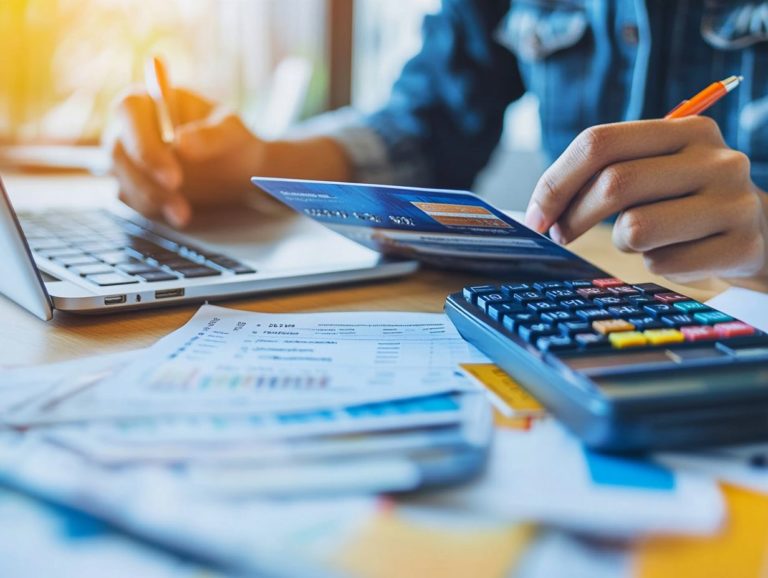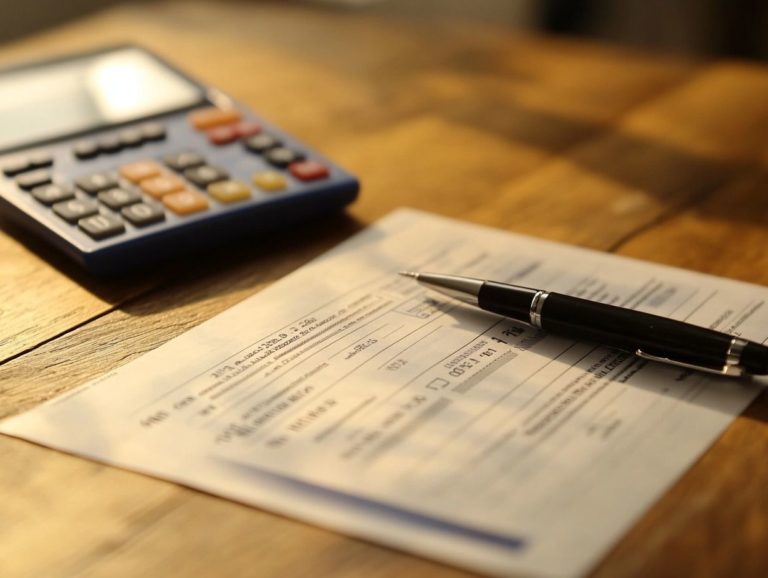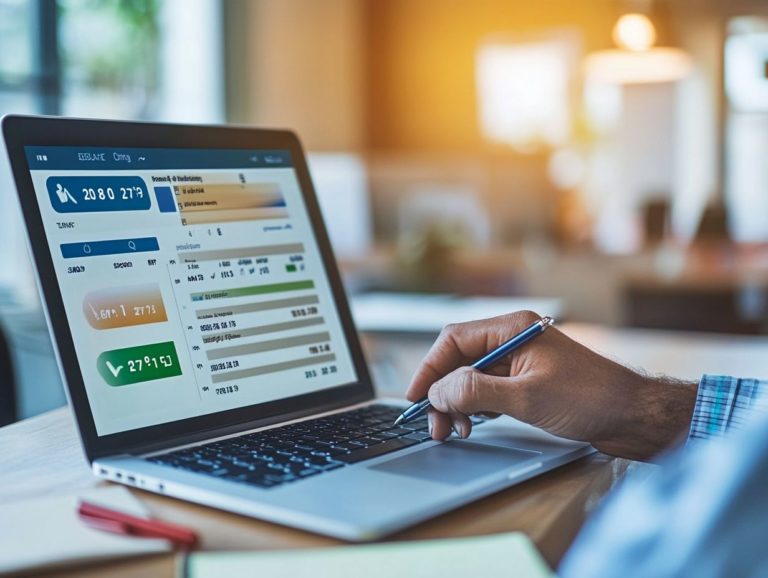Credit Card Usage for Online Shopping: Safety Tips
In today s digital landscape, online shopping offers an effortlessly convenient way for you to purchase everything from groceries to the latest gadgets.
With the surge of e-commerce, credit cards have become a favored payment method, providing you with ease and security. While there are undeniable benefits to using credit cards for your online purchases, it s important to acknowledge the associated risks.
This article delves into the advantages of credit cards for online shopping, shares essential safety tips to safeguard your information, and outlines the steps to take if your card details ever fall into the wrong hands.
Discover how to shop wisely and securely!
Contents
Key Takeaways:
- Always use credit cards for online shopping for convenience and security.
- Protect your personal information and be cautious of scams.
- Report fraud immediately and take action to safeguard yourself.
Overview of Online Shopping and Credit Cards
Online shopping has completely transformed the way you purchase goods and services. It offers the unparalleled convenience of browsing from the comfort of your own home.
Credit cards enhance your shopping experience. They allow you to make transactions swiftly while benefiting from added security features.
The integration of payment gateways is crucial for facilitating secure transactions. They ensure that your sensitive information, like credit card numbers, is kept safe during online purchases.
With the growing popularity of digital wallets, you now have the option to store your payment methods securely. This streamlines your shopping experience and cuts down the time spent at checkout.
These innovative technologies not only enhance convenience but also improve security with extra identity verification and encryption, effectively shielding you from potential threats. In this dynamic landscape of online shopping, the synergy of credit cards, payment gateways, and digital wallets highlights a trend toward safer and more efficient purchasing methods.
Benefits of Using Credit Cards for Online Shopping
Utilizing credit cards for online shopping presents a wealth of advantages, including heightened security, unmatched convenience, and the allure of potential rewards. This is why they ve become the go-to payment method for countless consumers.
One standout benefit is the zero liability policy, safeguarding you against unauthorized charges. Coupled with features like fraud monitoring and secure payment confirmations, you can confidently fill your shopping cart, leaving the worries of online transaction risks behind.
Convenience and Security
The convenience of using credit cards for online shopping is invaluable. It enables you to make quick transactions while easily accessing your transaction history, significantly enhancing your overall shopping experience.
With secure payment features and advanced fraud monitoring systems, credit cards offer a solid layer of security. They ensure your personal information remains protected during those online purchases. Create strong passwords to secure your information!
Using a digital wallet streamlines your payment process, making it simpler and faster while adding an extra layer of defense against potential threats. Digital wallets often employ advanced encryption technologies that safeguard your sensitive information, making it challenging for unauthorized users to access your personal data.
When you consistently choose complex, unique passwords and update them regularly, you effectively reduce the risk of falling victim to identity theft or credit card fraud. By combining these tools and practices, you can enjoy a seamless yet secure online purchasing experience, allowing you to shop with absolute confidence.
Safety Tips for Using Credit Cards Online
When you use credit cards for online shopping, it’s absolutely vital to follow safety tips that protect your personal information from identity theft and fraud. Always check that the website is secured with an HTTPS protocol (a security protocol for safe online transactions) and has an SSL certificate before entering your billing details. Additionally, consider applying tips for using credit cards responsibly to enhance your financial security.
Exercise caution when shopping over public Wi-Fi networks, as these can put your sensitive information at risk. Using VPNs (Virtual Private Networks that help you browse securely) and antivirus software can add an extra layer of security, helping you stay protected against suspicious transactions.
Protecting Personal Information
Protecting your personal information is essential when using credit cards for online shopping, especially since cybercriminals often target unsuspecting shoppers for identity theft. By opting for secure payment methods and setting strong passwords, you can significantly reduce the risk of someone else using your account.
Engaging in fraud monitoring practices allows you to quickly identify suspicious transactions, enabling prompt action in the event of a potential security breach. Beyond these foundational measures, consider using virtual credit cards or payment services like PayPal for added security.
Regularly reviewing your bank statements helps you spot any unauthorized charges swiftly. If you encounter a transaction that seems off, act fast contact your bank or service provider and dispute the charge immediately.
Educating yourself about phishing scams and recognizing secure website indicators can empower you to shop with confidence. By taking these proactive steps, you can relish the convenience of online shopping while keeping your financial information secure.
Recognizing and Avoiding Scams
Recognizing and avoiding scams is crucial for anyone using credit cards for online shopping. Stay vigilant for signs of suspicious transactions, like unexpected email notifications or payment confirmations from unfamiliar merchants. Implementing fraud alerts can keep you informed about any unusual activity on your accounts.
Regularly reviewing your bank statements for unfamiliar charges is essential, as is ensuring the security of the websites you use for shopping. Pay particular attention to the URL, confirming it begins with ‘https://‘ and features a padlock icon, indicating a secure connection. Scammers often hide in the shadows, presenting fake websites or offers that seem too good to be true.
By keeping your personal information private and avoiding public Wi-Fi for transactions, you can significantly reduce your risk of falling into these online traps.
Steps to Take if Your Credit Card Information is Compromised
If you believe your credit card information may have been compromised, act fast to prevent any unauthorized charges and protect your financial assets.
Begin by meticulously reviewing your transaction history for any suspicious activity. Promptly report any unauthorized charges to your credit card provider. Consider utilizing fraud monitoring services for enhanced protection. These services can help you track your payment methods and navigate the complexities that follow a security breach, ensuring you stay one step ahead in safeguarding your finances.
Stay safe and shop smart!
Reporting Fraud and Taking Action
Reporting fraud and taking quick action is vital to protect yourself from unauthorized charges. If you see any mistakes in your payment history or suspect your account has been compromised, contact your credit card provider immediately.
Using fraud alerts can help monitor suspicious activity. This adds an extra layer of security against future threats.
When you reach out to your credit card provider, have your account number and details of the suspicious charges ready. This makes the reporting process smoother and often leads to a quicker resolution.
Reporting incidents is important, but you should also maintain updated fraud alerts with the credit bureaus. This can help protect your financial identity.
By using security features like two-factor authentication (a security method that requires two forms of identification) and real-time transaction notifications, you can catch potential fraud early. Stay vigilant to ensure any suspicious activity is addressed quickly.
Frequently Asked Questions
What safety tips should I follow for online shopping?
1. Always shop on secure and trusted websites. Look for the lock symbol or “https” in the website address.
2. Keep your credit card details private. Never share them via phone or email.
3. Regularly check your statements for unauthorized charges.
4. Use strong, unique passwords for all your accounts.
5. Avoid public Wi-Fi when shopping online.
6. Consider a virtual credit card number for added security.
How can I protect my credit card from online fraud?
1. Keep your credit card safe and don t let others see your details when making a purchase.
2. Use a credit card with a low limit for online purchases. This limits potential losses if your information is stolen.
3. Enable transaction alerts to get notifications for purchases. This helps you spot unauthorized charges quickly.
4. Be cautious of emails or pop-ups asking for your details; they might be scams.
5. Use reputable antivirus software to guard against online threats.
6. If you suspect fraud, contact your credit card company right away to report it and cancel your card if needed.
Is it safe to save my credit card information on shopping websites?
It’s generally not safe to save your credit card info on shopping sites. While it’s convenient, it increases risk if the site gets hacked. It’s better to enter your details each time for maximum security.
What should I do if I find a fraudulent charge on my statement?
If you spot a charge you didn t make, contact your credit card company immediately. They can help dispute the charge and may reverse it. Change your password and keep an eye on your account for more suspicious activity.
How Can I Protect My Credit Card When Shopping Online?
1. Shop with trusted retailers. They usually have strong security measures in place.
2. Use a credit card with extra security features, like a chip and a security code on the back.
3. Avoid clicking links in unsolicited emails. They might lead to fake sites designed to steal your information.
4. Keep your devices and browsers updated. This ensures you have the latest security protections.
5. Always log out after making a purchase. Remember to clear your browsing history and cookies regularly!
6. Stay informed about online security threats. Regularly check your credit card statements for suspicious activity.






